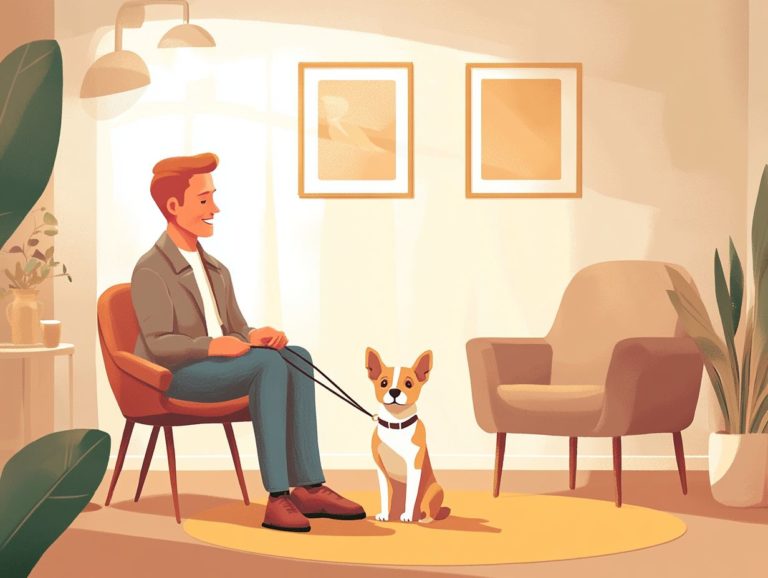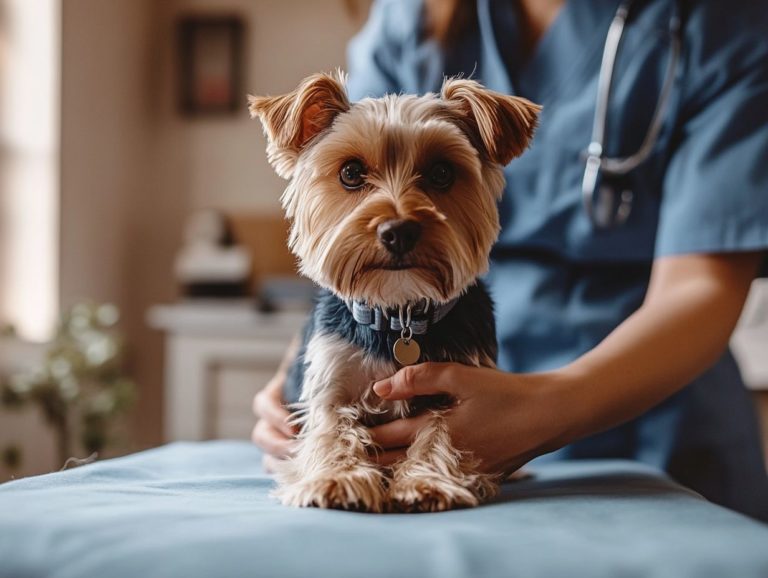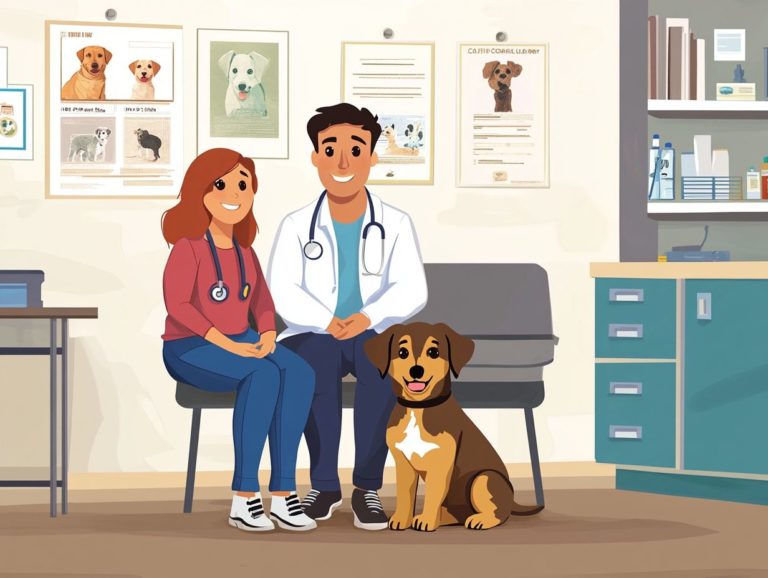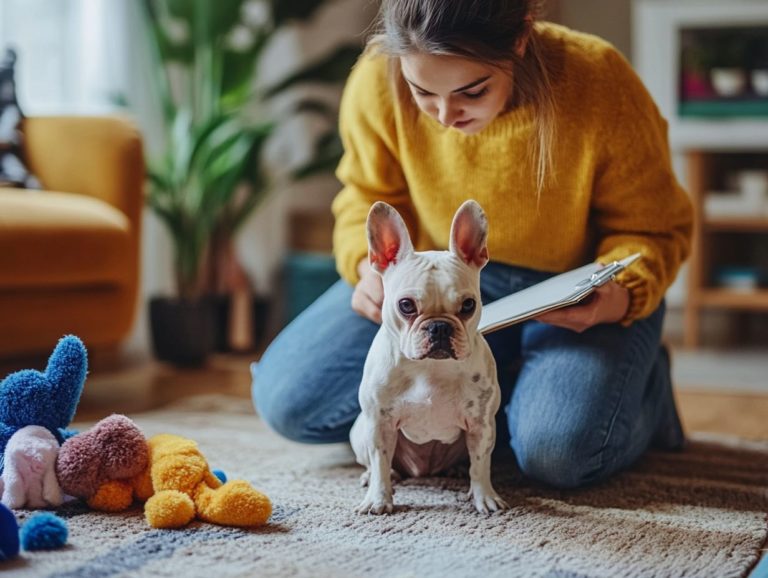Signs Your Pet Needs Expert Help for Anxiety
Pet anxiety is a prevalent concern that can significantly impact your furry companion s well-being. Understanding the causes and triggers of this anxiety is essential for recognizing when your pet is in distress.
This article delves into the signs of anxiety, covering both behavioral and physical indicators. It emphasizes when it s time to consult a professional and outlines various forms of assistance available, including therapy and medication. Additionally, it provides practical tips for managing anxiety at home.
Every pet deserves a peaceful life let’s make it happen together!
Contents
Key Takeaways
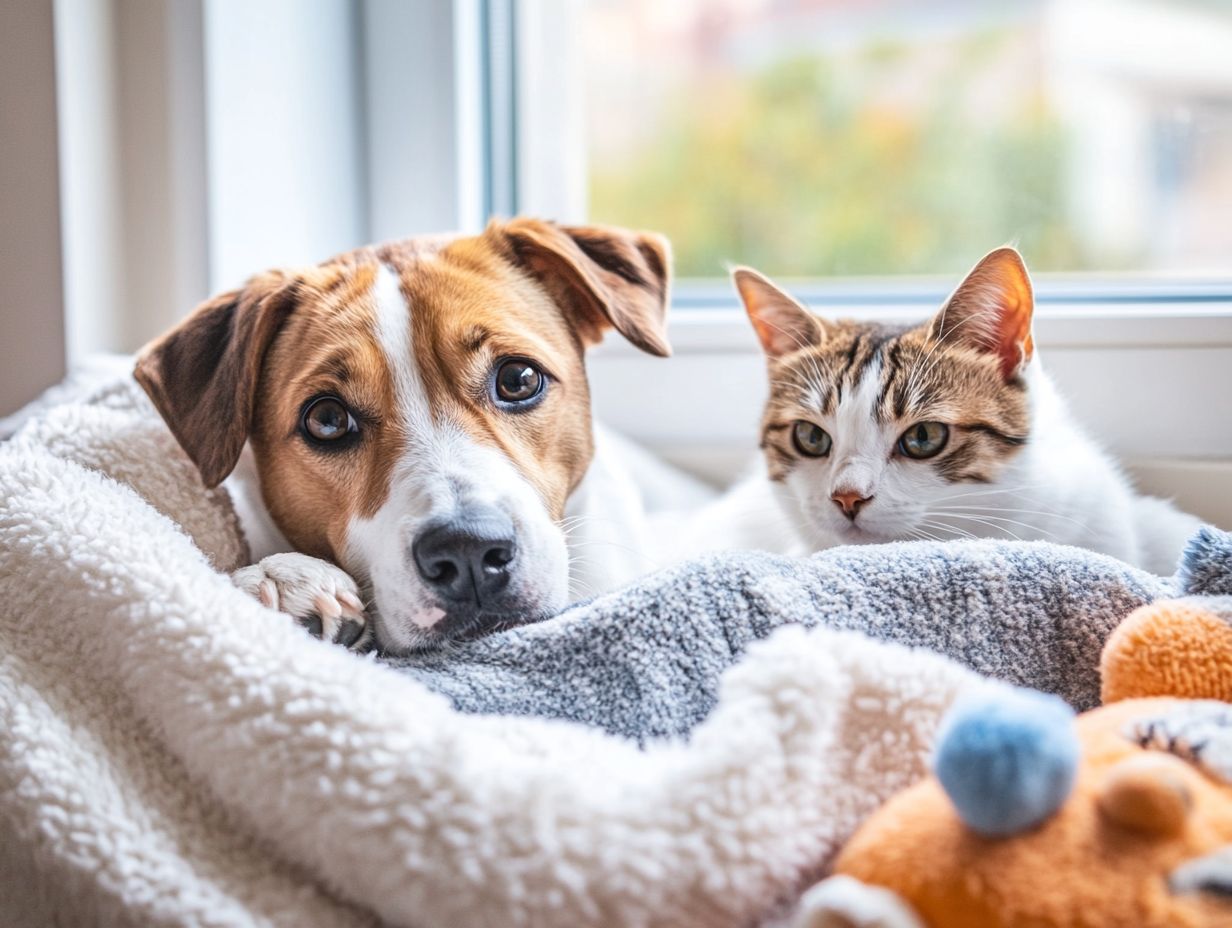
- Anxious pets may show physical and behavioral signs, such as excessive panting, pacing, and destructive behavior.
- Severe anxiety in pets can lead to serious health problems. Pet owners should seek expert help if their pet’s anxiety affects daily life.
- Expert help for pet anxiety can include therapy, medication, and other options. Pet owners can also manage anxiety at home by creating a calm environment and using positive reinforcement techniques.
Understanding Pet Anxiety
Understanding pet anxiety means exploring the intricate emotional landscapes that can affect both dogs and cats. This anxiety can show itself in various ways, including separation anxiety, which is when pets get upset when left alone, fear-related anxiety, and situational anxiety. These disorders can greatly impact your pet’s emotional well-being and overall health, often resulting in behavioral challenges that require thoughtful management.
By recognizing stress triggers and understanding the underlying causes, you can take proactive steps to create a supportive environment. This not only helps alleviate anxiety symptoms but also nurtures a sense of security for your beloved furry companions.
Causes and Triggers
The causes and triggers of pet anxiety are complex and multifaceted. They weave together a mix of environmental, genetic, and situational factors that can profoundly impact anxious dogs. Changes in routine, unfamiliar surroundings, or even traumatic experiences can trigger anxiety in your pet.
For example, the thunderous roar of a storm or the crackle of fireworks can instantly trigger fear-related anxiety. Welcoming new family members or experiencing your absence may lead to symptoms of separation anxiety. Some dogs may even have a genetic predisposition to anxiety, making them particularly sensitive to stressors.
Understanding these dynamics helps you identify specific triggers leading to anxiety in your pets. This knowledge empowers you to create a calmer environment and implement effective coping strategies to help your furry companions thrive.
Signs of Anxiety in Pets
Recognizing the signs of chronic anxiety in pets is essential for timely intervention. These symptoms can present themselves in both behavioral and physical forms.
You might notice common indicators like excessive barking or destructive behavior. However, be attentive to the more subtle signs as well changes in appetite or withdrawal from social interactions can be just as telling.
Behavioral and Physical Indicators
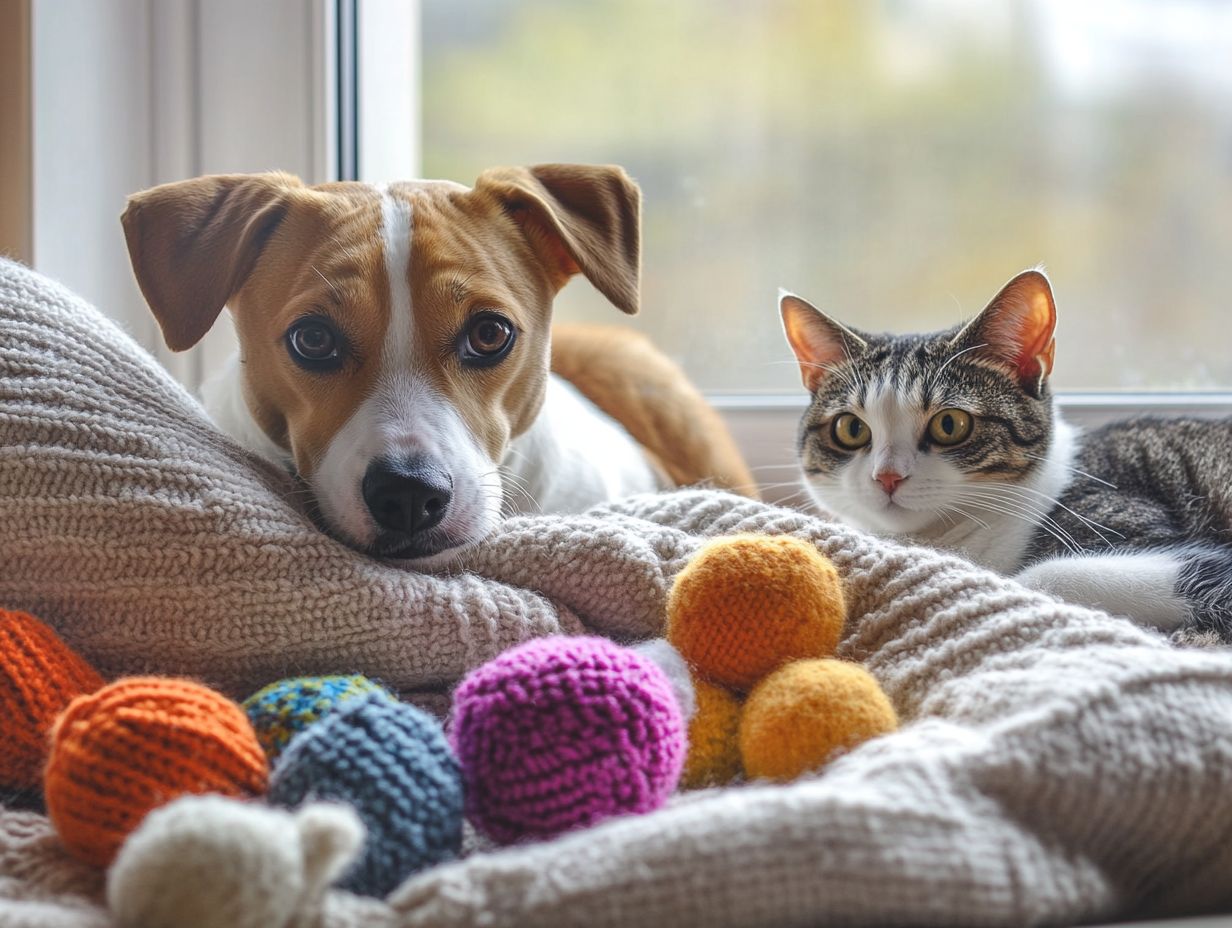
Behavioral and physical indicators of anxiety in pets can show up in various ways. You might notice anxious dogs displaying signs of nervousness, pacing restlessly, or hiding away. For further insights, what your vet wants you to know about anxiety can provide valuable information. Physical symptoms can include trembling or excessive salivation, further signaling their distress.
Cats have their own unique expressions of anxiety. You may see them engaging in excessive grooming or avoiding the litter box both clear signs that something is wrong.
Some pets may also show destructive behaviors, such as chewing on furniture or clawing at doors, in a frantic attempt to escape their discomfort.
Changes in appetite are also common. A pet that usually devours their meals might suddenly lose interest in food, reflecting their emotional state. Understanding anxious behaviors in pets is crucial, as recognizing these anxiety symptoms early allows for timely interventions, ultimately fostering a happier and healthier living environment for your beloved companion.
When to Seek Expert Help
Knowing when to seek expert help is vital for pet owners dealing with anxiety disorders. Recognizing the signs your pet needs help with anxiety is crucial, as severe anxiety can lead to serious behavioral problems, compromising your pet’s quality of life and straining your bond.
In these situations, turning to a veterinarian or certified dog trainers for a tailored treatment plan is essential. This proactive approach can restore balance and harmony in your relationship with your beloved pet.
Identifying Severe Anxiety and When to Act
Identifying severe anxiety in pets means recognizing symptoms that disrupt their daily lives and demand your immediate attention. Look for persistent destructive behavior, intense fear-related reactions, or dramatic shifts in behavior that may indicate an anxiety disorder. To ensure you get the best help, watch for signs you’ve found the right pet anxiety expert.
Signs like excessive barking, constant pacing, or withdrawal from social interactions are critical indicators. If your pet hesitates to engage in activities they once loved, or if you notice significant changes in their eating or sleeping patterns, it’s time to consult a professional for pet anxiety.
Pay close attention to these behaviors! Acting quickly can greatly improve your pet’s life. Addressing these symptoms promptly is essential for enhancing your pet’s quality of life and ensuring their emotional well-being.
Types of Expert Help Available
You have various expert support options to manage pet anxiety. From veterinary intervention, which may involve anxiety medications, to training techniques to change behavior provided by certified dog trainers, you can tailor a treatment plan that caters to your pet’s unique needs. To learn more about available options, refer to understanding different types of pet anxiety experts.
Each approach aims to alleviate anxiety and ensure your furry friend feels more at ease in their environment.
Therapy, Medication, and Other Options
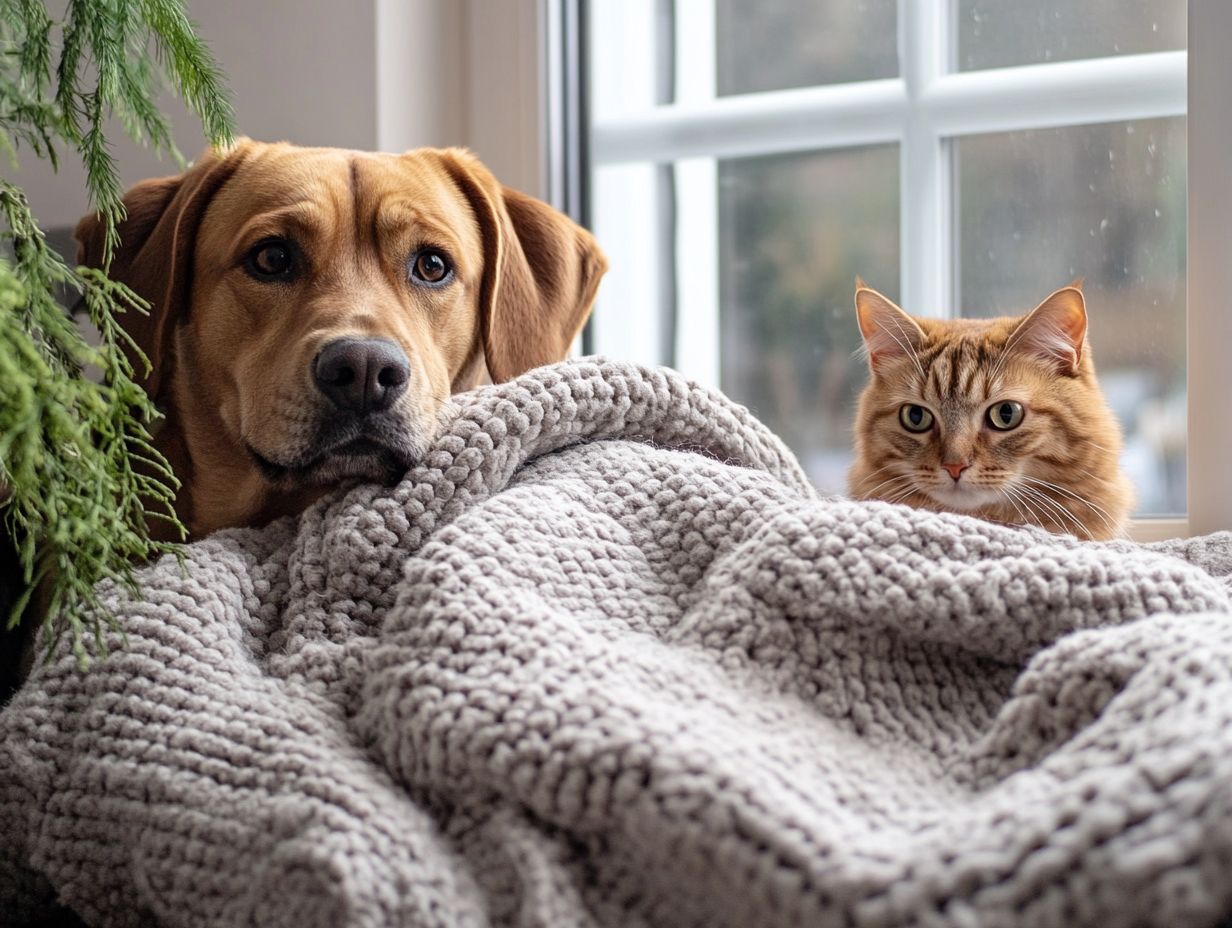
Options for your pet dealing with anxiety include a thoughtful blend of training techniques, anxiety medications like Fluoxetine or Clomipramine, and natural calming products such as CBD oil. Each plays a vital role in alleviating symptoms and enhancing your pet s overall well-being.
Additionally, exploring methods like desensitization training and pocket-sized calming aids like pheromone diffusers can be particularly effective. These training techniques modify your pet’s response to anxiety triggers, gradually teaching them to remain calm through gentle exposure.
While anxiety medications can offer immediate relief, consult with a veterinarian to determine the right dosage and be aware of potential side effects, which may include lethargy or gastrointestinal issues.
Natural calming products, such as herbal supplements, provide a softer alternative with fewer side effects, though their effectiveness may vary. By understanding these options, you can choose the best strategy to help your furry companion feel secure and relaxed.
Managing Pet Anxiety at Home
Managing pet anxiety at home requires a proactive approach. Implement effective training strategies while ensuring your dog gets proper exercise and mental stimulation.
Incorporating calming techniques can help create a stress-free environment for both your anxious canine and yourself.
Tips and Strategies for Reducing Anxiety
To effectively reduce anxiety in your pets, you can adopt a range of strategies, including positive reinforcement training, ensuring they get proper exercise, and using calming techniques like aromatherapy or pheromones natural substances that can help calm pets.
Incorporating these methods creates a more serene environment for your pets. For instance, positive reinforcement training not only strengthens the bond between you and your pet but also builds their confidence, which can significantly alleviate anxiety.
Regular physical activity is another essential aspect. Engaging in walks, play sessions, or interactive games keeps your pets mentally and physically stimulated, ultimately reducing their stress levels.
Calming techniques, such as using lavender essential oil in a diffuser or pheromone sprays, have been shown to foster a comforting atmosphere. By combining these approaches, you can greatly enhance your pet’s overall well-being and emotional health.
Frequently Asked Questions
What are some common signs that my pet may need expert help for anxiety?
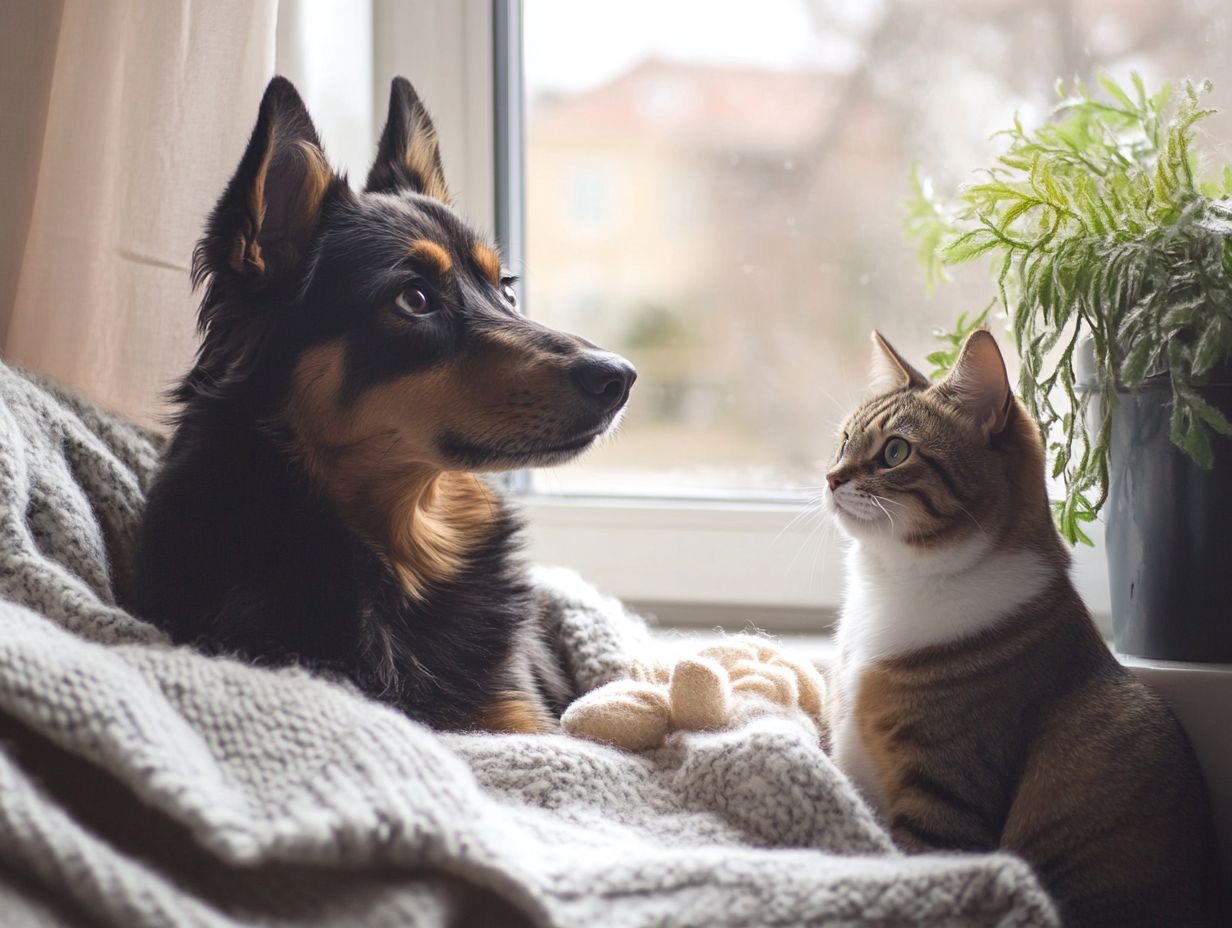
Some common signs include excessive barking or meowing, destructive behaviors, withdrawal or hiding, changes in appetite, and avoiding certain places or people. If you notice these signs, it may be time to explore what to do if your pet’s anxiety worsens, as they can indicate underlying anxiety disorders.
What causes anxiety in pets?
Anxiety in pets can be caused by a variety of factors, including past traumas, changes in routine or environment, separation from their owners (known as separation anxiety), and certain medical conditions such as cognitive dysfunction syndrome.
Can anxiety in pets be treated?
Yes, anxiety in pets can be treated with the help of a trained professional. They can provide behavior modification techniques, develop a treatment plan, prescribe anxiety medications if necessary, and help identify and address the root cause of the anxiety.
How can I help reduce my pet’s anxiety at home?
Some ways to help reduce your pet’s anxiety at home include providing a safe and comfortable environment, sticking to a consistent routine, and engaging in calming activities such as massage or gentle playtime.
Make sure your pet gets enough exercise and mental stimulation to help reduce anxiety.
Is it necessary to seek expert help for my pet’s anxiety?
Don’t wait! Seek expert help if your pet’s anxiety is affecting their happiness and quality of life. Understanding the importance of professional guidance in pet anxiety can lead to effective solutions. A veterinarian or dog trainer can help improve your pet’s well-being.
Are there any natural remedies for pet anxiety?
While some natural remedies may help alleviate your pet’s anxiety, such as CBD oil or calming products, consult with a veterinarian or animal behaviorist before trying any new treatments. Some options include herbal supplements, essential oils, and pheromone sprays.
We’d love to hear your experiences with pet anxiety! Share your stories in the comments or reach out for professional advice.

